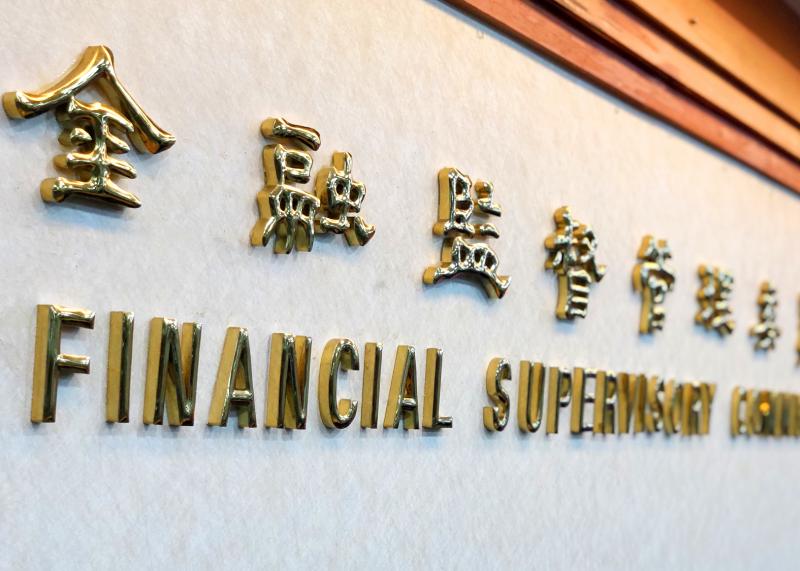The Financial Supervisory Commission (FSC) plans to strictly supervise foreign-registered Taiwanese companies listed on the Taiwan Stock Exchange after Tony Huang (黃文烈), the former chairman of Cayman Islands-registered Pharmally International Holding Co (康友製藥), was indicted for allegedly colluding with Chinese businesspeople to falsify accounts and financial statements.
In a written report to the Legislative Yuan, the commission said that it is scheduled to brief lawmakers on its measures to supervise the management of so-called “KY stocks” at a meeting of the legislature’s Finance Committee today.
KY stocks refer to overseas Taiwanese businesses with a primary listing on the nation’s main board.

Photo: Kelson Wang, Taipei Times
The Taiwan Stock Exchange on Aug. 18 suspended trading of Pharmally shares pending the company’s second-quarter financial statement and the results of the investigation into Huang, who disappeared on Aug. 6 and is reportedly in Singapore.
“The commission has asked the Taiwan Stock Exchange to propose relevant strengthening measures,” the FSC said in the report. “That includes the implementation of seven measures derived from three aspects: corporate governance, expert supervision and supervisory agency.”
Among the new measures is a requirement that certified public accountants inspect foreign-registered companies’ financial statements every six months beginning next year, as opposed to the current annual inspection, the report said.
To expand the scale of Taiwan’s capital markets, promote the internationalization of domestic capital markets and advance the diversification of financial products, the government in 2008 began to encourage overseas Taiwanese businesses to seek a primary listing in Taiwan, the report said.
Taiwan’s campaign to attract investors and explore potential opportunities has seen the number of KY companies reach 110 as of the end of October — 77 on the Taiwan Stock Exchange and 33 listed on the Taipei Exchange.
The Taiwan Stock Exchange once touted the listing policy as an opportunity for overseas Taiwanese businesses to consider business upgrades, channel development, long-term corporate sustainability and improve brand recognition.
The commission plans to bolster its corporate governance mechanism by enhancing the function of listed companies’ audit committees and improving information disclosure, the report said.
For instance, independent directors are asked to monitor implementation of their company’s internal controls and lending practices, while companies are encouraged to hold more conference calls with investors, and their chairpersons or independent directors are advised to attend the conference in person, it said.
As for expert supervision, the commission said that equity underwriters should visit the companies every year to meet with board directors and independent directors, as well as attend board meetings or review the minutes of the meetings every year for two years to better understand the company’s financial status and operations.
Meanwhile, the report said that the Taiwan Stock Exchange and the Taipei Exchange need to collect further corporate credit information and immediately grasp information that affects a company’s financial situation.

NEW IDENTITY: Known for its software, India has expanded into hardware, with its semiconductor industry growing from US$38bn in 2023 to US$45bn to US$50bn India on Saturday inaugurated its first semiconductor assembly and test facility, a milestone in the government’s push to reduce dependence on foreign chipmakers and stake a claim in a sector dominated by China. Indian Prime Minister Narendra Modi opened US firm Micron Technology Inc’s semiconductor assembly, test and packaging unit in his home state of Gujarat, hailing the “dawn of a new era” for India’s technology ambitions. “When young Indians look back in the future, they will see this decade as the turning point in our tech future,” Modi told the event, which was broadcast on his YouTube channel. The plant would convert

‘SEISMIC SHIFT’: The researcher forecast there would be about 1.1 billion mobile shipments this year, down from 1.26 billion the prior year and erasing years of gains The global smartphone market is expected to contract 12.9 percent this year due to the unprecedented memorychip shortage, marking “a crisis like no other,” researcher International Data Corp (IDC) said. The new forecast, a dramatic revision down from earlier estimates, gives the latest accounting of the ongoing memory crunch that is affecting every corner of the electronics industry. The demand for advanced memory to power artificial intelligence (AI) tasks has drained global supply until well into next year and jeopardizes the business model of many smartphone makers. IDC forecast about 1.1 billion mobile shipments this year, down from 1.26 billion the prior

People stand in a Pokemon store in Tokyo on Thursday. One of the world highest-grossing franchises is celebrated its 30th anniversary yesterday.

Zimbabwe’s ban on raw lithium exports is forcing Chinese miners to rethink their strategy, speeding up plans to process the metal locally instead of shipping it to China’s vast rechargeable battery industry. The country is Africa’s largest lithium producer and has one of the world’s largest reserves, according to the US Geological Survey (USGS). Zimbabwe already banned the export of lithium ore in 2022 and last year announced it would halt exports of lithium concentrates from January next year. However, on Wednesday it imposed the ban with immediate effect, leaving unclear what the lithium mining sector would do in the